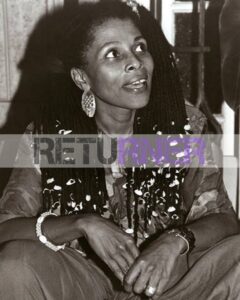
Assata Shakur, born JoAnne Deborah Byron, is a pivotal figure in the history of Black liberation movements in the United States. A former member of the Black Panther Party and the Black Liberation Army, Shakur became emblematic of radical resistance against systemic racism and state violence during the 1970s. Her activism, however, was overshadowed by her 1977 conviction for the murder of New Jersey State Trooper Werner Foerster following a controversial shootout on the New Jersey Turnpike. Shakur maintained her innocence, citing political persecution. In 1979, she escaped from prison and was granted asylum in Cuba, where she remains to this day. Her fugitive status led to her being placed on the FBI’s Most Wanted Terrorists list, making her the first woman to appear there. Shakur’s life continues to provoke debate—revered by some as a revolutionary icon, condemned by others as a criminal—her legacy remains deeply contested and historically significant.
Also Read: TREESHA THOSAR BIOGRAPHY: The Complete Account, Verified Records & Legacy
Assata Shakur Age (Verified Timeline and Records)
Assata Shakur was born on July 16, 1947, in New York City, under the name JoAnne Deborah Byron. Following her marriage to fellow activist Louis Chesimard, she became known as JoAnne Chesimard—a name later used in legal proceedings and official records. Her transformation into Assata Shakur marked a symbolic rebirth aligned with her revolutionary ideals and affiliation with the Black Liberation Army.
At the time of her death on September 25, 2025, Shakur was 78 years old. Cuban authorities confirmed that her passing was attributed to “health conditions and advanced age,” a phrasing that suggests a natural decline rather than any acute illness. While specific medical details were not disclosed, her age played a central role in the official cause of death, reflecting the cumulative toll of decades spent in exile and limited public engagement. Her death closes a chapter on one of the most polarizing figures in American political history.
Assata Shakur Net Worth (Analysis of Assets and Holdings)
Estimating Assata Shakur’s net worth is inherently complex due to her decades-long exile in Cuba, limited financial disclosures, modest living conditions, and reliance on revenue from her autobiography and occasional speaking engagements, rather than conventional assets or investments.
Assata Shakur Children (Profiles of the Immediate Family)
Assata Shakur married Louis Chesimard before divorcing in 1970; she had one child, Kakuya Shakur, who has publicly affirmed her identity as Assata’s only daughter.
Assata Shakur Parents (Documented Origin and Childhood)
Assata Shakur was born to Doris E. Johnson and an accountant father in New York City. Raised primarily by her mother, Shakur’s early development was shaped by her grandparents’ nurturing presence and her aunt Evelyn A. Williams, a civil rights attorney who profoundly influenced her political consciousness.
Assata Shakur Education (Credentials and Qualifications)
Assata Shakur earned her GED before attending Borough of Manhattan Community College and later City College of New York (CCNY). During her time at CCNY, she became a vocal advocate for the inclusion of Black studies courses, aligning her academic pursuits with her political activism. Her educational journey reflected a deep commitment to intellectual empowerment and cultural liberation.
Assata Shakur Spouse (Marital History and Divorce)
Assata Shakur married Louis Chesimard in 1967; ideological differences led to their 1970 divorce.
Assata Shakur: Radicalization and the Black Liberation Army
Assata Shakur’s transition from the Black Panther Party (BPP) to the Black Liberation Army (BLA) marked a decisive shift in her political strategy—from community-based activism to militant resistance. Disillusioned by what she perceived as the BPP’s internal fragmentation and limited tactical scope, Shakur aligned with the BLA, a clandestine organization committed to armed struggle against systemic oppression. Her radicalization was rooted in a belief that nonviolent protest was insufficient to dismantle entrenched racial hierarchies and state violence.
Shakur’s embrace of armed confrontation placed her at the center of numerous criminal investigations. Between 1971 and 1973, she faced multiple charges, including bank robbery, attempted murder, and kidnapping—many of which were later dismissed or resulted in acquittals. However, her 1977 conviction for the murder of a New Jersey State Trooper solidified her status as a symbol of revolutionary defiance. Her ideological pivot to the BLA reflected a broader trend among activists who viewed armed resistance as a legitimate path to liberation.
Assata Shakur: Prison Escape, Cuban Exile, and FBI Most Wanted Status
In 1979, Assata Shakur escaped from a New Jersey prison with armed assistance, later securing political asylum in Cuba under Fidel Castro’s government. In 2013, she became the first woman designated on the FBI’s Most Wanted Terrorist list, symbolizing enduring tensions between U.S. law enforcement and revolutionary exile.
Also Read: Kirk Bondad BIOGRAPHY: The Complete Account, Verified Records & Legacy
Assata Shakur: Definitive Fact Sheet and Career Highlights

Death: Passed away in Havana, Cuba, on September 25, 2025, at age 78 due to age-related health complications.
Birth Name: Born JoAnne Deborah Byron on July 16, 1947, in New York City.
Legal Alias: Known legally as JoAnne Chesimard following her marriage to Louis Chesimard.
Conviction: In 1977, convicted of first-degree murder in the death of State Trooper Werner Foerster.
Prison Escape: Escaped from Clinton Correctional Facility in New Jersey on November 2, 1979.
Cuban Asylum: Granted political asylum by Fidel Castro’s government in 1984, where she remained until her death.
FBI Status: Named the first woman on the FBI’s Most Wanted Terrorists list in 2013.
Famous Quote: “I am a revolutionary. A Black revolutionary.” — widely cited in activist circles.
Also Read: Who is Tyler Robinson? His Biography, controversies, Parents, Age, and Education
Family Connection: Godmother to rapper Tupac Shakur, whose mother Afeni Shakur was also a Black Panther.
Autobiography: Authored Assata: An Autobiography, published in 1987, now considered a seminal text in Black radical literature.